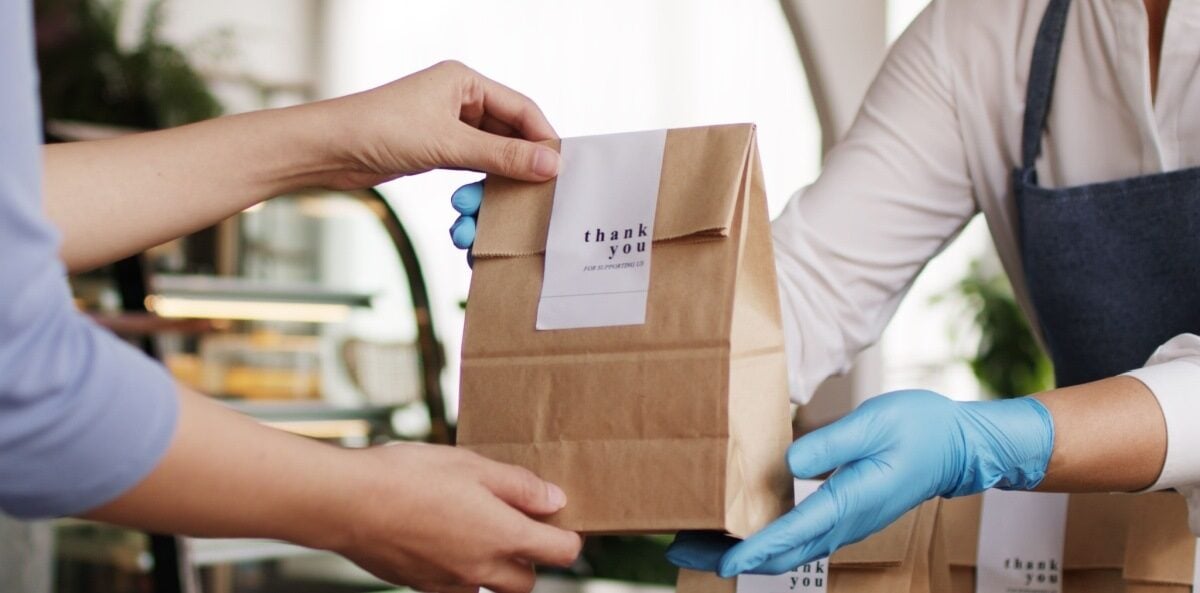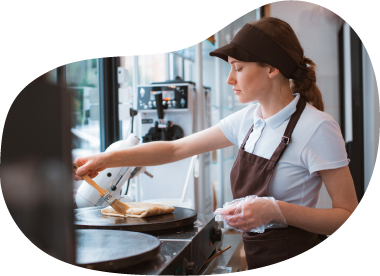What to know about food handling licenses and insurance

Proper food safety procedures are essential to running a thriving food and drink establishment. As a small business owner, you should ensure that you and your employees have the appropriate food safety training before opening your restaurant, bakery, or deli.
When do you need to obtain a food handlers card or license?
If your business makes or serves food, you and your employees will likely need to undergo some kind of food safety training.
This training covers basic food safety knowledge, such as ensuring food is cooked to an appropriate temperature, food safety measures are in place, and preventing exposure to foodborne illnesses.
Examples of safety measures covered in food handlers card classes may include:
- The best ways to ensure safe food cooking, serving, and storage
- How to clean food-contact surfaces
- Temperature specifics for different types of food
- Proper attire to wear while preparing food
- Techniques that food workers can use to safely handle waste and dispose of garbage
- How to check expiration dates and what to do with expired food
- Proper handwashing techniques
- Illnesses that can come from improper food techniques and how to prevent them
The training programs cover FAQs about public health and should ensure that you and your employees are ready to run a successful food service establishment after completing the food handlers course.

How do I know if my business needs a food handling license?
There are two different types of certifications: food handlers cards for employees and food manager certifications for members of leadership or those who oversee operations. States determine which certification is required and who qualifies for which certification.
ANSI National Accreditation Board (ANAB) is the largest accrediting food safety agency in the United States. It certifies many of the eligible training courses held around the country. Some states require that employees working with food obtain an ANAB-accredited card.
The specific requirements vary by state. Some states will require employees to have a food handlers permit before starting at a restaurant or bar, while others will give a grace period of up to 60 days before the food handlers license needs to be obtained.
Employers are responsible for maintaining their employees' records to ensure compliance and to confirm that food safety card renewals are done at appropriate times.
How to get a food handling license
Most U.S. states require food service employees to have a food handlers permit, often called a "food handlers license" or "food handlers card." The certification is typically obtained by attending a food safety training course and passing a final exam on the basics of food safety.
After the course, the instructors will provide a certificate of completion in addition to an actual food handlers card or license. The food handlers certificate is often good for a certain period of time, such as 3 years in New York City and the State of Illinois.
Getting a food handlers permit is easier than ever. Plenty of companies offer online ANSI-accredited food safety course training. Online training courses offer great flexibility and are sometimes even offered in other languages besides English, such as Spanish and Arabic.
Many local health departments will also provide in-person food safety training courses. Depending on your city and state, the Department of Health food handlers training courses are generally accredited based on local requirements.
The United States Department of Agriculture can help connect you with your local health department, or you can simply google "food handler training course near me" for the most convenient locations. Just check that the class is accredited based on your needs.
Commercial kitchens and food service establishments will need to get additional licenses in order to operate. This often requires kitchens to purchase certain equipment, abide by thorough fire safety requirements, and provide adequate training to employees.
How do food handling license requirements vary by state?
Each state has different requirements for businesses and employees that serve food. Certain cities and counties will have additional rules and requirements.
For example, the Florida Department of Health requires a designated "Food Manager" to obtain a special manager's certification. Other employees need to obtain a food safety certification within 60 days of employment and renew it every three years.
In Oklahoma, there are no mandatory food handler requirements for employees; however, each establishment must have a trained employee who oversees food safety and trains other employees in best practices.
California requires all employees who handle food to obtain a California Food Handler Card within 30 days of starting a job. The State of Texas also requires all employees, full and part-time, to obtain a food handlers card within 30 days of employment.
Other states, like Arizona, have specific requirements about what topics need to be discussed in food safety courses but leave it up to the counties to decide their own requirements.
Check with your local and state health department's website to make sure you and your employees have adequate food preparation training in your jurisdiction.

What types of insurance coverage do food handlers need?
Food service businesses greatly benefit from a range of insurance policies to protect the establishment, the employees, and the customers.
- Most states require workers' compensation insurance if you have more than one employee. This policy will protect employees in the event of an injury or accident while at work.
- If you or your employees use company vehicles for transportation, such as catering or vending at events, then a commercial auto policy is usually a good idea and is often a state requirement.
- General liability insurance is also required in many states for food and beverage establishments in order to sign commercial leases. It protects your customers if they are injured or if their property is damaged during their visit. It also protects you against potential lawsuits claiming libel, slander, or copyright infringement.
- If your restaurant or bar serves liquor, you should consider a liquor liability insurance policy. This policy will protect your business in the event that an intoxicated person causes an injury or property damage while under the influence of alcohol your business provided.
- Cyber insurance is a great choice if you use a computer system to take payments or online orders, or if your establishment has a mailing list. It will protect your business in the event of data breaches.

Find food and beverage service insurance with Insureon
Ensuring your restaurant and employees comply with local food handler safety requirements is a fantastic way to protect your customers and your business investment.
If you'd like to learn more about the best insurance policies for your food and restaurant establishment, start an easy online application. Our licensed insurance agents will gladly set you up with insurance policies to meet your needs and your budget, often within 24 hours.
Kate Sortino, Content Specialist
Kate is passionate about all things related to content, marketing, and SEO. She enjoys taking complicated topics and making them delightfully readable. Kate has a background in software content marketing and has professionally written about many topics, including finance, SEO, and mental health. Before becoming a full-time writer, Kate worked in social services and healthcare. When Kate’s not sitting in front of a computer, she’s typically exploring the outdoors with her husband and puppy.









